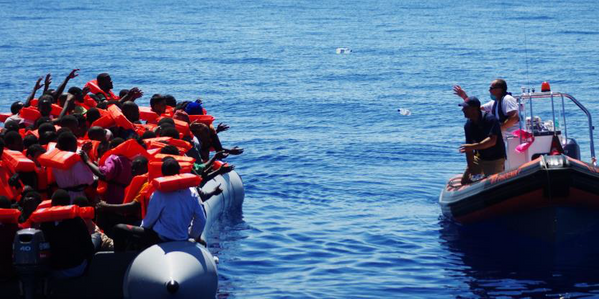
Migrant rescue will be one of a range of important issues to be discussed at the International Maritime Rescue Federation (IMRF)’s World Maritime Rescue Congress to be held from June 1-4 in Bremerhaven, Germany.
Hosted by the German Maritime Search and Rescue Service (DGzRS), the event will include a presentation from Martin Xuereb, Director of MOAS (Migrant Offshore Aid Station) on the challenges of rescuing migrants in the Mediterranean.
MOAS acts as an aid station to support vessels in need of assistance, coordinating its efforts with search and rescue authorities around the Mediterranean and last year helped save 3,000 migrants during its 60 day mission.
Over 200,000 migrants in distress were rescued by Governmental and Non-Governmental Search and Rescue (SAR) organizations and merchant ships in 2014, but more than 3,000 lives were lost. Concerns are increasing: the number needing to be rescued this year is expected to escalate. The increasing loss of lives has led to high level talks amongst European States and in the SAR community.
There will be further discussion of the migrant rescue issue at the Congress.
James Vaughan, International Director for the Royal National Lifeboat Institution (RNLI), will address another major issue – drowning – a global problem that requires action across a range of Governments and agencies.
Delegates will hear that an estimated 40 people drown every hour of every day and amongst young people (1-24), it is one of the 10 leading causes of death around the world. Overall, the death toll from drowning is two thirds of that from malnutrition and well over half of that from malaria.
James will refer to the World Health Organization (WHO)’s important new Global Report on Drowning that suggests a ten point plan for countries to adopt and which includes some obvious areas for the maritime SAR community to be involved in. He will ask whether all those at the Congress should be lobbying their respective Governments and relevant bodies to support the WHO’s recommendations.
In contrast, Abd Elkhalik Kamal-Eldin Soliman Selmy, a lecturer from the Arab Academy for Science, Technology and Maritime Transport, will examine the role of an unmanned aircraft system in SAR operations.
He will describe the technological progress made in the field of aviation, navigational satellite systems and automated remote control systems. As well as using Unmanned Aircraft Systems (UAS) in military and security applications, they have great potential in civilian situations such as fighting forest fires, meteorological observation, scientific research, environmental protection – and search and rescue.
Still focusing directly on the theme of search and rescue operations, Thomas Lübcke, Head of Research, German Maritime Search and Rescue Service, will present on the importance of cooperation with a case study on the role of the Local Incident Coordinator.
The University of Cologne (Germany), together with the DGzRS (German Maritime Search and Rescue Service), conducted a research project on this topic between 2012 and 2015 and the findings should enable organizations to adapt their working procedures and training.
This workshop will aim to improve the decision-making abilities of SAR personnel in complex missions. It will also draw greater attention to the important topic of individual and professional decision-making in such operations.
Austin Andemani, of the Royal Life Saving Society, Uganda, will be examining training for rescue and recovery in low cost and low technology environments, linking to the WHO report on drowning by using examples of how the Bronze Medallion Award provides effective training for rescue and recovery in Uganda, where Police and Fire Brigades are called on to support or replace rescue services.
He will also talk about the challenges for training to Bronze Medallion level, including the fact that there is no current tracking mechanism for those who have gained it to ensure they are current; no policy for those involved in rescue and recovery to have it and the high cost of training due to the hiring of relevant equipment and infrastructure.
The World Maritime Rescue Congress only takes place every 4 years.



